This resource compiles a variety of materials that are relevant to consumer advocates working on policy reforms related to the collection of unsecured consumer debts (credit card debts, medical debt, etc.).
Background
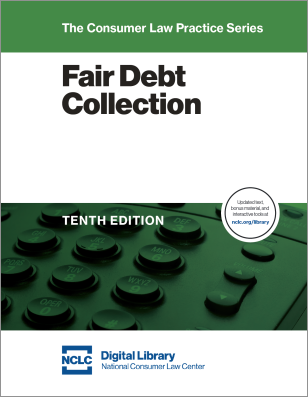
Chapter 1 of NCLC’s Fair Debt Collection manual reports about various topics related to the collection of unsecured consumer debts, including:
Parties Commonly Involved in Debt Collection
- 1.3.1.5 Race, Ethnicity, and Debt Collection – Discussing racial and ethnic disparities at various stages in the lifecycle of a debt.
- 1.3.1.3 Mental Health and Consumer Debt – Discussing the association between indebtedness and poor mental health.
- 1.3.4.2 Amount and Types of Debt Sold in the United States – Compiling public information about the amount and types of consumer debt sold.
How Debts Are Collected
- 1.4.9.1 Number of Debt Collection Lawsuits – Collecting research about the number ofcollection lawsuits filed in state courts around the country.
- 1.4.9.4 Default Judgments – Collecting research about default judgments in collection lawsuits around the country.
- 1.4.9.5 Representation by Attorneys – Collecting research about the lack of attorney representation for consumers sued in collection lawsuits.
Data
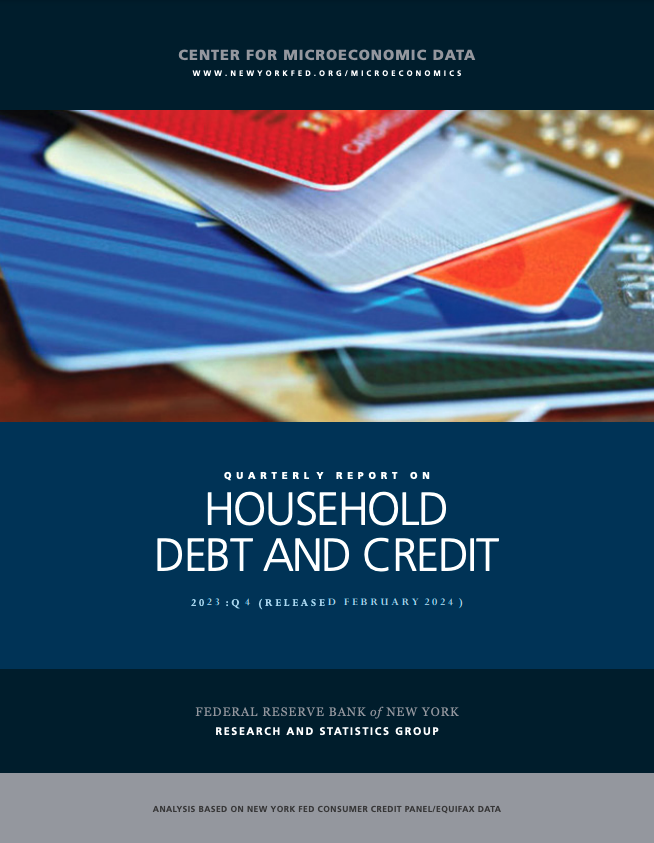
Total Household Debt
- The Federal Reserve Bank of New York publishes a Household Debt and Credit Report, updated quarterly. Data includes the amount of nonhousing debt broken down into student loan, credit card, auto loan, and other as well as the percent of balances 90+ days delinquent.
- The Federal Reserve Bank of Philadelphia – Consumer Credit Explorer is an iterative tool for examining trends with different types of debt at the regional, state, and national levels.
Debt in Collection on Credit Reports
The Urban Institute’s Debt in America: An Interactive Map provides information about debt in collection on credit reports as of August 2025. This resource includes:
- National, state, and county level data;
- Filters to show all, medical, student, or auto/retail debt;
- The share of consumers with debt in collection from communities of color; and
- The percent of young adults with debts in collection.
Collection Lawsuits
In addition to any data available from state trial courts, the following resources also provide data about collection lawsuits in multiple jurisdictions.
- The Debt Collection Lab based at Princeton University publishes a Debt Collection Tracker with data about debt collection lawsuits in the following jurisdictions:
- Arizona (Maricopa County only)
- California (data for 21 counties)
- Colorado (Denver County only)
- Connecticut (state and county-level data)
- Indiana (state and county-level data)
- Minnesota (state and county-level data)
- Missouri (state and county-level data)
- North Dakota (state-level data)
- Ohio (Hamilton County data only)
- Pennsylvania (Philadelphia County data only)
- Texas (Denton, Fort Bend, Galveston, Harris, and Tarrant County data only)
- Virginia (state-level data)
- Westlaw Edge Litigation Analytics (subscription required) can be used to analyze data about debt collection lawsuits. Coverage for state courts includes the following. Starred states only have partial coverage, which may represent only a few counties.
- Alaska Superior & District Courts
- Arizona Superior Courts*
- California Superior Courts*
- Connecticut Superior Courts
- Delaware Superior Courts
- Florida Circuit Courts*
- Georgia Superior, State, & Magistrate Courts*
- Illinois Circuit Courts*
- Indiana Superior & Circuit Courts*
- Kansas District Court*
- Maryland Circuit Courts*
- Michigan Circuit Court*
- Minnesota District Courts
- Missouri Circuit Courts*
- North Dakota District Courts
- New Jersey Superior Courts
- Nevada District Courts*
- New York Supreme Courts
- Ohio Court of Common Pleas*
- Oklahoma District Courts*
- Oregon Circuit Courts*
- Pennsylvania Courts of Common Pleas*
- Tennessee Circuit Courts *
- Texas District & County Courts*
- Utah District Courts
- Virginia Circuit Courts*
- Washington Superior Courts
- Wisconsin Circuit Courts
Consumer Complaints
- The Consumer Financial Protection Bureau’s Consumer Complaint Database can be searched for complaints about debt collection or narrowed to search for complaints from residents of a particular state, about a particular company, or about a particular type of debt (e.g., medical debt).
- Complaints about particular debt collection companies can also be found at the Better Business Bureau by searching by company name.
- Information about consumer complaints filed with state regulators may be available online or via public record request.
Licensure for Debt Collectors
Not all states require debt collectors to be licensed. Cornerstone Licensing Services publishes a map of Debt Collection State [Licensing] Laws. The information below provides some links for determining if a particular debt collector is licensed when there are state licensing laws.
- Some states use the Nationwide Multistate Licensing System (NMLS) to report whether a debt collector is licensed in their state. You can search the NMLS for a company name using the Consumer Access portal.
- Other states may make lists of licensed debt collectors available through the state regulator’s website.
Financial Health
- The Urban Institute’s Financial Health and Wealth Dashboard provides data at the city, county, and state level about a variety of metrics, including:
- delinquent debt and student loans,
- households with $2,000 in emergency savings,
- median credit score,
- health insurance coverage, and
- median net worth.
- The Board of Governors of the Federal Reserve System conducts a Survey of Consumer Finances every three years that includes a variety of data about income, assets, and debt.
Changes in Medical Debt Over Time
The Urban Institute’s The Changing Medical Debt Landscape in the United States allows users to see changes in the number of Americans with medical debt on credit reports and how this has changed over time from 2011 to 2023.
Model Legislation
NCLC has published several model laws related to consumer debt collection, including:
- Model State Coerced Debt Law (May 2024) – Coerced debt is a form of economic abuse and an avenue for abusers to limit the economic independence of an individual. This model law provides two options for drafting: (1) a complete, free-standing model law, and (2) language you can add to existing laws in your state.
- Model Medical Debt Protection Act (Rev. Mar. 2025) Provides sample language to protect consumers by:
- Improving financial assistance policies, and
- Adding safeguards to protect consumers from aggressive or unfair debt collection practices.
- The Model Family Financial Protection Act (Rev. Nov. 2023) – Provides sample language to reform a broad variety of state law provisions related to the collection of consumer debts. It is divided into two titles:
- Consumer contract and collection protections, and
- Property exempt from creditors.
- Model Statute of Limitations Reform Act (2015) Provides sample language to reform statutes of limitations laws by:
- Creating a uniform 3 year limitation period for the collection of consumer debt,
- Extinguishing debts after that period runs,
- Prohibiting renewal of that limitations period, and
- Limiting collection on judgments to five years.
The Uniform Law Commission also has two model laws related to consumer debt collection:
- Consumer Default Judgments Act (2023). Provides a framework evaluate requests for default judgments.
- Wage Garnishment Act (2016). Sets out model state law protections from wage garnishment. NCLC provides consumer amendments to this model law.
What States Can Do to Help Consumers
In addition to model legislation, NCLC has published a variety of short issue briefs to outline different types of possible state policy reforms.
Some issue briefs in this series that are relevant to collection of unsecured consumer debts are:
- Debt Collection
- Medical Credit Cards and Other Medical Lending Products
- Medical Debt
- Prohibiting Medical Debt on Credit Reports
- Student Loans
Comparing State Policies
This section collects resources that compare state laws related to the collection of unsecured consumer debts. It is divided into two sections: state policy indexes/reports and legal treatises.
State Policy Resources
Consumer Debt Litigation
- National Consumer Law Center (NCLC), No Fresh Start reports – Compare state post-judgment exemption laws protecting wages, bank accounts, homes, cars, and household goods.
- January Advisors, Wage Garnishment Protections Dashboard (June 2025) – Compares state wage garnishment protections.
- National Center for Access to Justice, Justice Index: Consumer Debt Litigation (Feb. 2024) – Compares state policies and ranks the states on consumer debt litigation.
- Temple University Beasley School of Law, Center for Public Health Law Research, State Debt Collection Litigation Laws (Feb. 2024) – Provides an overview of state statutes, regulations, and court rules governing debt collection lawsuits that were in effect as of January 1, 2023.
Medical Debt
- NCLC, The Latest on Keeping Medical Debt Out of Credit Reports (2025) and Don’t Add Further Insult to Injury: Medical Debt & Credit Reports (Jan. 2023) – Collects state laws regulating when and how medical debt can be reported to a credit bureau.
- Community Catalyst, A Compendium of State Policies to Curb Hospital Prices and Reduce Medical Debt (Oct. 2023). Reviews state policies in the following areas: (1) required hospital discounts; (2) free care and financial assistance; (3) billing and collections; (4) facility fees; and (5) price transparency. Provides state-specific summaries.
- The Commonwealth Fund, State Protections Against Medical Debt: A Look at Policies Across the U.S. (Sept. 2023) – Compares state protections against medical debt, including regulation of billing and collections practices and protections related to medical debt lawsuits, in the 50 states and the District of Columbia.
- NCLC, An Ounce of Prevention: A Review of Hospital Financial Assistance Policies in the States (Aug. 2023) – Provides an overview of the financial assistance policies in the 50 states and the District of Columbia, and looks at the level of financial assistance mandated, or not, in each jurisdiction.
- NCLC, Don’t Add Further Insult to Injury: Medical Debt & Credit Reports (Jan. 2023) – Collects state laws regulating when and how medical debt can be reported to a credit bureau.
- Innovation for Justice, Medical Debt Policy Scorecard (May 2022) – This index compares medical debt consumer protection policies in the 50 states.
Legal Treatises
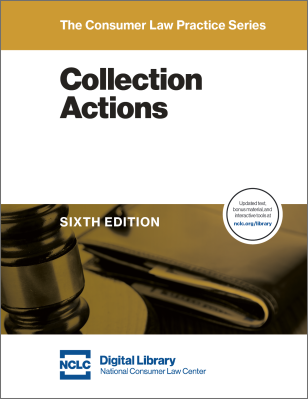
NCLC, Collection Actions (subscription required)
Policies Related to Collection Lawsuits
- 3.4.2.2 Specific States’ Pleading Requirements As to Proof of Assignment – Lists filing requirements related to proof that a debt buyer owns the debt.
- 3.4.3.2 Specific State Pleading Requirements [As to the Nature of the Collector’s Claim] – Lists requirements that must be included in the debt collector’s complaint beyond the proof of assignment.
- 3.6 Prior Notice As a Precondition to Suit – Discusses state laws requiring notice of a right to cure a default.
- 3.7.3.2.1 Borrowing Statutes Described – Lists states with statutes that require, when an action arose elsewhere than the forum state, that the action can only be brought if within the limitations period that applies under the law of the state where the action arose.
- 3.7.4.2 State-by-State Listing of Limitations Periods for Breach of Contract – Lists state statutes of limitations for written and non-written contacts.
- 7.2 State SCRA Statutes Summarized – Summarizes state laws similar to the federal Servicemembers Civil Relief Act.
- 13.3.4 General State Standards for Setting Aside a Judgment – Discusses state laws that deviate from Federal Rule of Civil Procedure 60 for setting aside a judgment and special state standards involving consumer debt.
- 13.3.11 Special Preconditions to Obtain a Default in Actions to Collect Consumer Debt – Summarizes state laws with specific evidentiary requirements that a collector must satisfy before a default judgment will be awarded.
Policies Related to Post-Judgment Collection
- 14.6.2 Statutes of Limitations for Enforcement of Judgments – Lists state statutes of limitations on how long a judgment can be enforced.
- 15.2.3 State Restrictions on Wage Garnishment – Discusses state limits on wage garnishment.
- 15.5.2 Specific State Statutory Exemptions for Bank Accounts – Discusses state laws exempting a sum of money held in a bank account.
- 15.5.3.2 State Statutes Specifying the Treatment of Joint Accounts – Lists state laws that discuss how exemptions applied to bank accounts should treat joint accounts.
- 17.2.2 Limits on Debtor’s Examinations – Lists state limits on debtor’s examinations.
- 17.3.1 State Constitutional and Statutory Limits [on Imprisonment for Debt] – Lists state constitutional and statutory provisions prohibiting imprisonment for debt.
- Appendix H Summaries of State Exemption Laws – Summarizes state exemption statutes. It focuses on statutes that exempt property of consumer debtors from collection by creditors. Statutes that provide special exemption rules for child support or other family support collections, or for other special types of debts, such as reimbursements to the state, are not summarized here.
Policies Related to Recovery of Collection Agency and Attorney’s Fees
- 6.3 State Statutes Allowing Recovery of Attorney Fees Regardless of Contract Terms – Lists states that allow recovery of attorney fees in suits on an “account stated” or “open account,” contract actions, and other types of claims.
- 6.6 Collection Agency Fees – Provides examples of state statutes that restrict collection agency fees.
- 18.1.3 Consumer’s Statutory Right to Fees When Collector Has a Contractual Right to Fees – Lists states that have enacted statutes to provide for reciprocal attorney fees, meaning that a prevailing consumer can recover fees if the credit agreement provides attorney fees for a prevailing creditor.
- 18.1.4 State Statutes Provide Fees for the Prevailing Party Under Certain Causes of Action – Summarizes state statutes that provide for attorney fees for the prevailing party in a collection action or provide fees for the party prevailing as to certain enumerated causes of action.
- 18.1.8.4 State-by-State Listing of Standards for Groundless Litigation – Summarizes state statutes that provide for attorney fees for a prevailing party when the other party’s claims were groundless or involved vexatious litigation.
Policies Applying to Specific Types of Debts
- 8.3.1 Civil Dishonored Check Statutes – Contains a list of civil dishonored check laws.
- 9.4.3 Medical Debtor Protection Laws – Provides a state-by-state summary of statutes and regulations protecting consumers with medical debt, including state financial assistance laws, state credit and collection laws, and state balance billing laws.
- 12.4.3 [Collection of Private Student Loans] Special Pleading Requirements and Limits on Default Judgments – Discusses states that have enacted pleading requirements or limits on default judgments that are applicable specifically to private student loans.
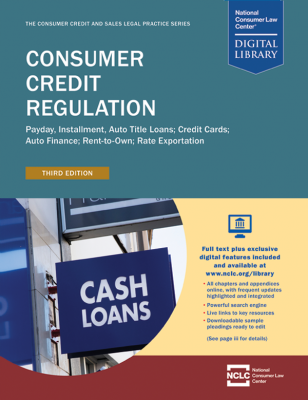
NCLC, Consumer Credit Regulation (subscription required)
- Appendix B Summary of State Lending Statutes – Compiles citations to state statutes that regulate non-mortgage consumer credit. Among other topics, this section contains citations to state statutes about interest on judgments.
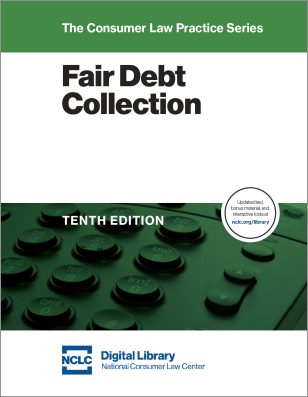
NCLC, Fair Debt Collection (subscription required)
- Appendix D Summary of State Debt Collection Statutes – Summarizes state debt collection practices statutes.
- Includes debt collection statutes of general applicability and statutes relating to collection of child support debts.
- Includes footnotes citing special restrictions in state statutes and court rules on debt buyers’ ability to obtain judgments against debtors, but does not summarize them.
- Does not include unfair and deceptive acts and practices (UDAP) statutes except to the extent that they include provisions directed specifically at debt collection.
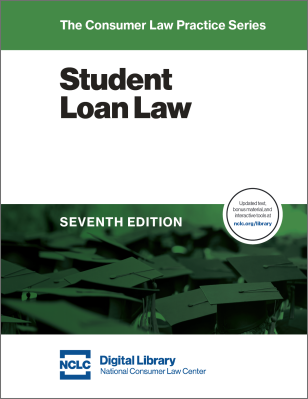
NCLC, Student Loan Law (subscription required)
- 16.7.3.1 Statutes Regulating Debt Collection of Private Student Loans – Discussing state laws regulating private student loan lender’s debt collection practices.
Henry J. Sommer and Richard Levin, Collier Bankruptcy Exemption Guide (subscription required)
- Compiles exemptions in every state and territory.
Other Reports and Issue Briefs
- NCLC, No Clear Relationship Between Wage Seizure Protections and Access to Credit (Feb. 2024) – Considers the academic literature and concludes that these articles do not show a clear relationship between increasing the protections from wage seizure and decreasing access to credit.
- NCLC, Consumer Protection and Court-Sponsored Online Dispute Resolution in Collection Lawsuits (Sept. 2023) – Considers what court-sponsored online dispute resolution (ODR) means for consumers who are sued in debt collection lawsuits by creditors collecting consumer debts and ways that courts may guard against potential problems.
For more information, please contact National Consumer Law Center Senior Attorney April Kuehnhoff ([email protected]).
See all resources related to: Debt & Bankruptcy